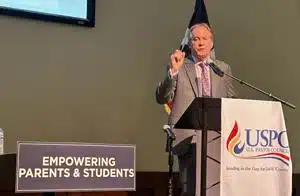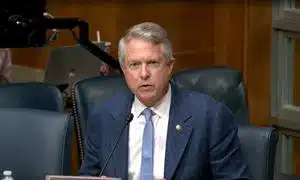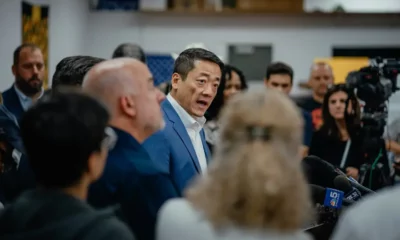(The Center Square) – Democrats announced fresh plans to thwart President Donald Trump’s tariffs on Monday as Trump plans new tariffs to protect Hollywood from foreign movies.
U.S. Sen. Chuck Schumer said Monday afternoon that he would co-sponsor legislation from Sen. Ed Markey to exempt small businesses from Trump’s tariffs.
“Protecting small businesses shouldn’t be a partisan issue,” Schumer said. “It’s a national priority.”
Trump announced a slate of higher tariffs on April 2 but suspended them seven days later. Trump said the 90-day pause was designed to give his trade team time to make deals with foreign countries to reduce the U.S. trade deficit. Trump kept a 10% baseline tariff on foreign imports and a 25% tariff on foreign-made passenger vehicles and auto parts.
Trump also hit China with 145% tariffs as the nation’s two largest economies face off over trade. China retaliated with 125% tariffs on U.S. goods. Trump also put tariffs on imported steel and aluminum.
On Sunday, Trump said he would direct the Department of Commerce to put 100% tariffs on foreign-made films, which drew silence from the Academy of Motion Picture Arts and Sciences and the Motion Picture Association.
“The Movie Industry in America is DYING a very fast death. Other Countries are offering all sorts of incentives to draw our filmmakers and studios away from the United States. Hollywood, and many other areas within the U.S.A., are being devastated. This is a concerted effort by other Nations and, therefore, a National Security threat,” Trump wrote on Truth Social. “It is, in addition to everything else, messaging and propaganda! Therefore, I am authorizing the Department of Commerce, and the United States Trade Representative, to immediately begin the process of instituting a 100% Tariff on any and all Movies coming into our Country that are produced in Foreign Lands.”
The White House said Monday that no decision had been made on Trump’s movie tariff, but all options were under consideration.
At the same time, Trump’s auto tariffs have been slow to produce firm commitments that automakers will make more vehicles in the U.S.
Last week, Detroit-based automaker General Motors told shareholders that it expected tariffs would cost the company about $4 billion to $5 billion, and it lowered its financial guidance for the year. GM CEO Mary Barra said the company has been in near continuous talks with President Donald Trump’s administration since the inauguration in January. Barra declined to say if the company would raise vehicle prices or move production from Mexico to the U.S.
On Monday, Ford suspended its financial outlook for the year.
“Given material near-term risks, especially the potential for industrywide supply chain disruption impacting production, the potential for future or increased tariffs in the U.S., changes in the implementation of tariffs including tariff offsets, retaliatory tariffs and other restrictions by other governments and the potential related market impacts, and finally policy uncertainties associated with tax and emissions policy, the company is suspending guidance,” the company said in a statement. “These are substantial industry risks, which could have significant impacts on financial results, and that make updating full year guidance challenging right now given the potential range of outcomes.”
The company said that tariff costs would cut about $1.5 billion from its adjusted pretax earnings.
















































